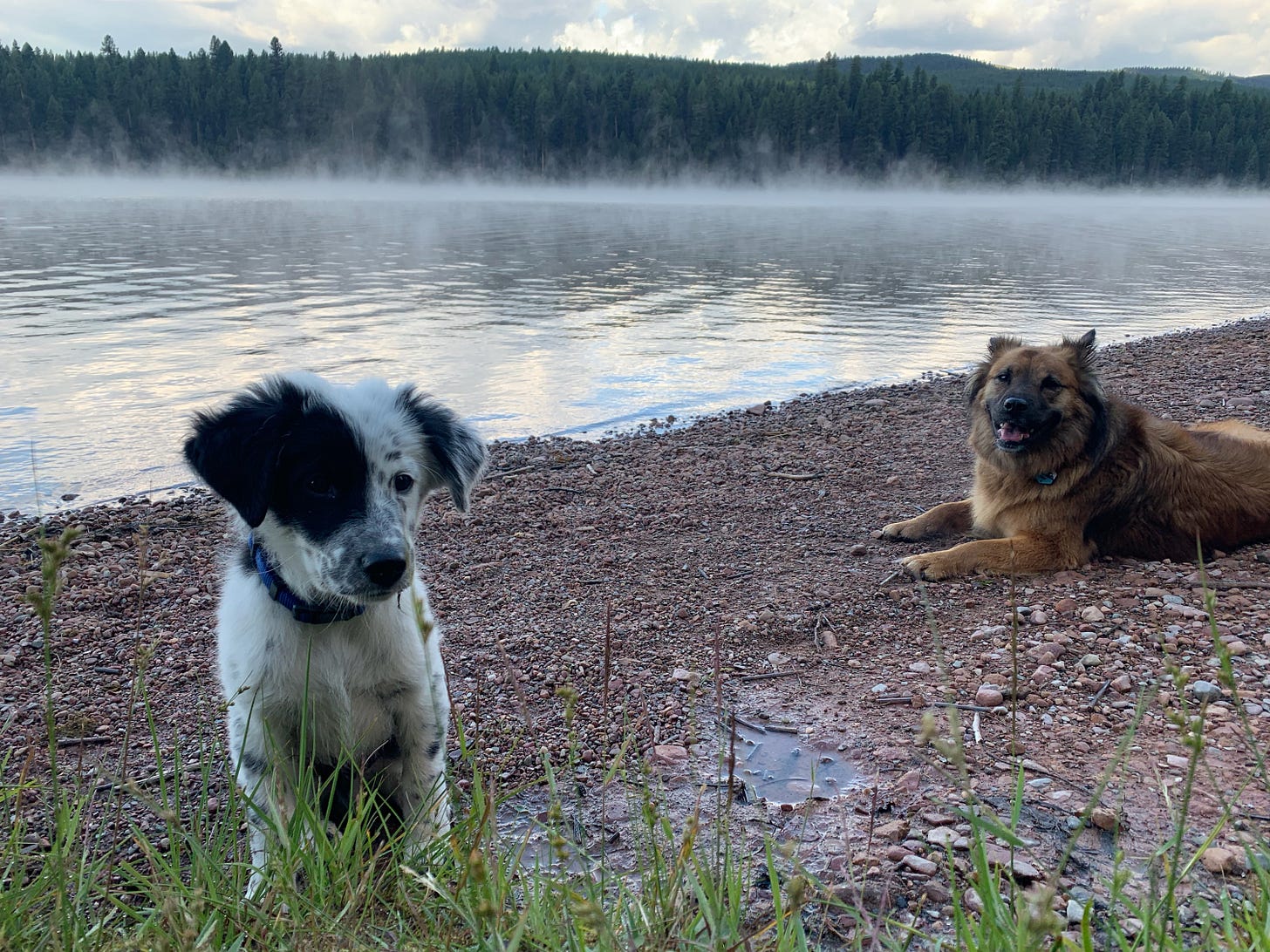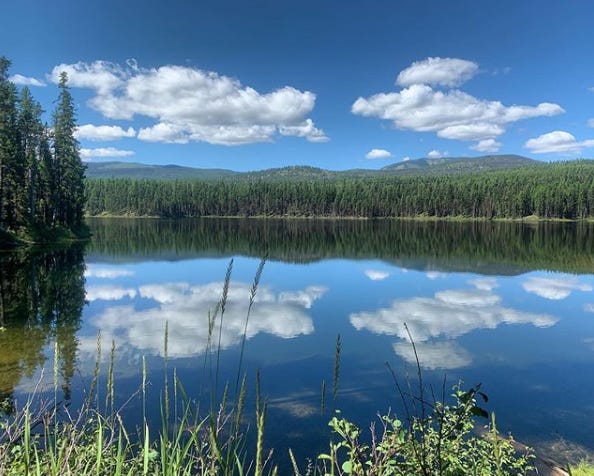what happens when you subtract the internet

The newsletter has been on inadvertent hiatus: I wanted to wait and see whether I’d feel inclined to write while writing so much else for the book, and the answer was no. (I don’t charge for the newsletter in part because I don’t want to feel obligated to do it — not because obligations are bad, but because I didn’t want to turn something that felt fun into something that felt, well, obligatory, and thus sucked the joy from it).
I’ve been writing the burnout for about a month now, and I’m rounding the corner towards the end of the (very messy first draft). A big part of my progress happened last week, when I went to a campsite in the Swan Valley, about an hour from where I live in Montana, with a solar generator, a big tent, and my two dogs (including new puppy Steve, who you can see up there on the left). I could get a very faint cell signal in one corner of the camp, just enough to send a few (very slow) text messages and upload photographs to Instagram. Otherwise it was me, my laptop, my notes, my books, and what felt like luxurious, expansive pools of time.
I woke up in the morning around dawn, when Steve made a few yelps to say he had to pee. Then we cuddled for another two hours. I’d get up, take the dog food down from the bear bag, and we’d go on a walk for an hour. Come back, make coffee, write for two to three hours. Go on a run along here:

Come back, get the dogs, rinse off a bit in the lake, read my book while eating lunch, work around three hours, have one 16 oz. IPA while doing a bit more work, take the dogs on another mile walk along the lake, make dinner, get in tent at 7:45 pm, read for 90 minutes, go to bed. I did that for six days. I wrote 20,000 words.
The number of actual writing hours wasn’t that huge — probably around six to seven a day. The difference is that I spent those six hours actually writing (or editing). And before you say that 20,000 is a ridiculous number of words, also keep in mind that a lot of this was just fleshing out outlines that I’d already put together that were chocked full of quotes, or narrativizing other people’s stories about their personal work/burnout experience. 20,000 words of this sort of writing is not the same difficulty level as 20,000 words of, say, fiction. (I’ll also say that my style of writing is barfing: I write it all, then spend significant amounts of time whipping it into shape, and it ultimately takes just as much time as people who write far slower but each paragraph is near-perfect when it hits the page).
But I have ambivalent feelings about writing that much, because what it really shows me is just how poorly — and inefficiently — I’ve been writing at home, when I’ve told myself all sorts of stories to keep the internet on, to keep Twitter refreshed. When I was camping and my mind wandered, sometimes I’d look at the “Stats,” or pull up my calendar to count, for the 27th time, how many days I have until the first draft is due. But most of the time I stared at something, pet one of the dogs, and returned to work — instead of doing all of the things that lead me into whatever weird, half-distracted digital corner at home. I wasn’t deeply focused so much as just plain old, internet-subtracted focused.
Of course, I was also able to write like that because of all of the things that accompany a writing retreat, no matter where it is or if there’s electricity. I didn’t have to care for any children. I didn’t have to talk to anyone except the occasional greetings to the nice retired couple in the next campsite. My food needs were minimal. I didn’t commute, or have to clean, save the daily excavation of pine needs from the tent. I didn’t have laundry. I didn’t have to shower or worry about my clothes. My work email is on an out of office auto-responder. I was getting nine hours of sleep a night, and had time to exercise, and even give my brain space from the book while reading fiction. The only thing I really had to worry about was whether or not my solar panel was in the sun.
Life was incredibly simple, and that simplicity allowed me to use the available pats of my brain — the parts that are usually allocated to thinking about all of those other things — to figure out how best to synthesize some of the most complicated ideas of the book.
I know that thousands of people can and do write with many, many distractions, and women especially have done this for as long as women have been writing. But it also clarifies why it’s long been easier for rich people and male people to have more opportunities to write: those other concerns, those immediate, quotidian complications vying for attention in their minds, are largely absent. The writing becomes the thing; not the thing fighting for a corner of the mind amidst the day’s schedule of obligations.
And yes! This is the central argument of Woolf’s “A Room of One’s Own”! Give women freedom from poverty and familial obligations! And just IMAGINE what that woman would do if you also gave her a room where she didn’t have internet, or cell service, but she was also confident that whoever was temporarily in charge of her responsibilities (including children) wouldn’t fuck them up!
Fittingly, I’m processing the fact of the amount of writing I was able to do without the internet or obligations as I prepare to write this next chapter, on how our phones (and the internet) exacerbate the conditions of burnout. I think part of my problem is I still expect myself to perform at the level of an internet-free writer’s retreat even when I’m mired in distraction/obligations, some of them of my own making, others outside of my control. I expect myself to write however many good words a day and be funny on Slack and post good things on Twitter and keep the house clean and cook a fun new recipe and keep my body healthy and text message my friends to ask appropriate questions about their growing children and check-in with my mom and grow tomatoes and walk the dogs and post a picture of that walk on Instagram and shower and put on cute clothes for that 30 minute Skype call and and and and
Of course, it’s a self-perpetuating cycle: the more I try to handle it all, the more I attempt to multi-task, switching between work and tasks and social media and the hellmouth of the news….and the less effective I become, which makes me even more anxious to try and juggle all of the above. Plus juggling all of the above exhausts me, which means I can’t find the energy to pick up an actual book, which means I just scroll through Instagram for seventeen lost minutes instead of reading an actual book for seventeen minutes that would, in all likelihood, actually clear my head in a meaningful and therapeutic way.
Burnout is so difficult to climb out of — and our desire to be all things to all people while fulfilling all responsibilities AND doing our jobs like they’re the only things in our worlds makes it all the more difficult. The internet hasn’t “made our lives easier”; it’s simply made “doing it all” mandatory.
If you have thoughts, however rambling, about how technology has contributed (or alleviated!) your burnout, I’d love to hear them — just reply to this email or email me at annehelenpetersen@gmail.com. Please tell me how you’d like to be identified in the book (first name, pseudonym, whatever). If I include your thoughts, I’ll send you a copy of the finished book.
If you’re interested in the specifics of my solar set-up, which kept my laptop and phone fully charged the entire time with very little effort, everything I had was from Goal Zero (a very good and helpful company), specifically, the Yeti 400 and the Boulder 100.
I’m not reading much on the internet, but a few things I did read and love over the last few weeks:
The best and smartest thing on FaceApp
Laura Turner evokes the incredibly specific feel of growing up Evangelical in the late ‘90s
This interview with David from the Real World: Seattle is for a very specific audience but wow is it for us
A very good piece on fast food/retail burnout
I’ve been waiting for a writer of this skill to be given the time and space to write about Chronic Lyme. An incredible piece.
This month’s just trust me
As always, if you know someone who’d like this sort of thing in their inbox once a week-ish, forward it their way. You can find a shareable link to it (and subscribe) here. You can follow Steve the Puppy on my Instagram here. Please forgive any weird sentences or typos; as I said above, my inattention to perfection is part of what makes this not feel like a slog and keeps me doing it. And a huge thank you to Man Repeller, which put this newsletter at #1 in their newsletter recommendation list earlier this week. There are so many good suggestions on this list, all of which are, as the headline puts it, “truly worth opening.”



